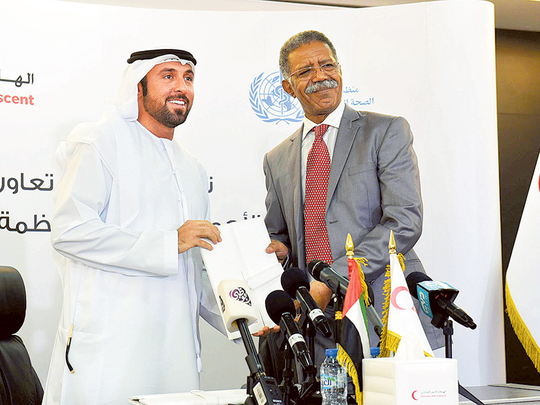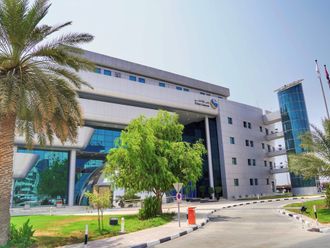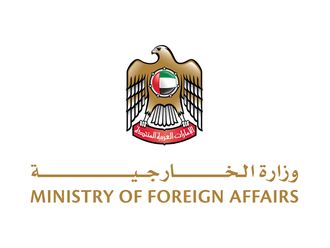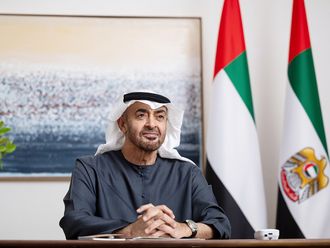
Abu Dhabi: The UAE has teamed up with the World Health Organisation (WHO) to restore 20 hospitals at a cost of Dh44.1 million in nine governorates in Yemen to provide health care to 2.3 million Yemenis, a top official said yesterday (Wednesday).
“The move, which also includes providing preventive shots to as many as 700,000 women and children in 11 governorates, underlines the continuous support provided by the UAE to alleviate the suffering of the Yemeni people and to strengthen their resilience to face the difficult circumstances they were enduring,” said Shaikh Hamdan Bin Zayed Al Nahyan, Ruler’s Representative in the Western Region and chairman of Red Crescent.
Shaikh Hamdan stressed that the UAE is at the forefront of countries sending relief to Yemen and that the humanitarian campaigns are a key part of the UAE foreign policy under the directives of the UAE leadership represented by President His Highness Shaikh Khalifa Bin Zayed Al Nahyan, His Highness Shaikh Mohammad Bin Rashid Al Maktoum, Vice-President and Prime Minister of the UAE and Ruler of Dubai, and His Highness Shaikh Mohammad Bin Zayed Al Nahyan, Crown Prince of Abu Dhabi and Deputy Supreme Commander of the UAE Armed Forces, and based on the approach of the founding father, the late Shaikh Zayed Bin Sultan Al Nahyan.
An agreement between the UAE and WHO was signed yesterday by Dr Mohammad Ateeq Al Falahi, secretary-general of Emirates Red Crescent and Dr Ahmad Farah Shadoul, WHO representative in Yemen.
The UAE offered Dh4.34 billion in foreign aid to Yemen from April 2015 to July 2016 as part of its humanitarian and development aid to support the Yemeni people and its ongoing efforts to lay down the foundations for development, security, stability and peace in Yemen.
Foreign aid to Yemen is delivered in three categories: development, humanitarian and charity.
Dr Al Falahi told Gulf News the UAE has provided Dh210.1 million to the health sector with emphasis on reconstruction of health facilities, including Al Jomhury Hospital, 22 May Hospital, 17 clinics, a mobile hospital and 19 ambulances.
“As many as 1,500 Yemenis injured in their country’s war were taken for treatment to hospitals in the UAE, Sudan and India by Emirates Red Crescent,” Dr Al Falahi added.
The ERC also paid for health workers to accompany the patients to provide psychological and moral support.
The UAE also funded restoring of and providing medical equipment and supplies to artificial limb service centres, a kidney dialysis unit, a maternity centre and two centres for people with special needs and a mobile clinic.
The WHO representative praised the UAE initiative, calling it “timely and highly appreciated”. “The UAE’s initiative will help millions of Yemenis access health-care services and more than 700,000 women and children be given preventive shots.”
Breakdown of aid
A breakdown of UAE foreign aid to Yemen by sector showed that humanitarian aid and emergency relief stood at Dh1.48 billion, representing 34.2 per cent of the total UAE foreign aid to Yemen
Food and medicine: UAE sent more than 160,000 tonnes of food material and more than 111,000 tonnes of medicines and medical supplies in addition to delivering ambulances and medical equipment.
Some 135 tonnes of food and non-food items and shelter materials were airlifted to relieve people affected by cyclones Chapala and Meg which hit the Yemeni island of Socotra and southern coast of Yemen in November 2015.
Development aid
Energy and electricity: Yemen received Dh2.85 billion, of which Dh800.9 million was earmarked for energy and electricity sectors, where the UAE bore the operational expenses of energy generation and supply.
Fuel and gas for power generation plants power generators were supplied. Local companies were contracted to operate and maintain these facilities in a number of governorates including Aden.
Five power generation stations were built, including two new ones in the governorate of Aden.
UAE also supplied diesel, fuel and petrol for power stations, hospitals, schools and public institutions in a number of governorates.
Transport and storage: Dh466.1 million was spent to provide equipment and vehicles for transport, water and fuel tankers to Aden, Marib and other governorates. The UAE has rebuilt airports and seaports in Aden and Socotra.
Education: A total assistance of Dh160.1 million was allocated for this sector to provide stationery, supplies and bags.
Some 212 schools — including 144 in Aden — were rebuilt and renovated in different governorates, while 32 schools were renovated in Socotra.
Water and sanitation: UAE rehabilitated the sewerage networks in Aden and the Shaikh Othman Directorate. Work also commenced on the Shaikha Fatima project for building 150 small irrigation ditches and the renovation of three water stations.
Law enforcement: UAE assistance included training of police forces, delivery of vehicles to the local police and coast guards, renovation of 17 police centres and Aden central jail, and provision of firefighting supplies to the Civil Defence.
Social services: Assistance included rehabilitation of the Corniche and eight parks in Aden. The UAE launched small-scale projects such as retail shops to increase incomes of families.












